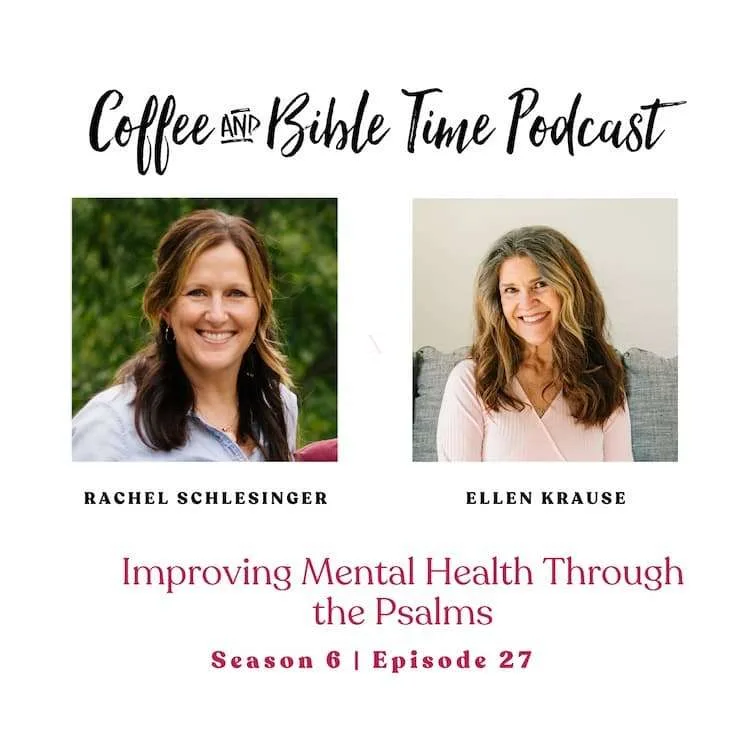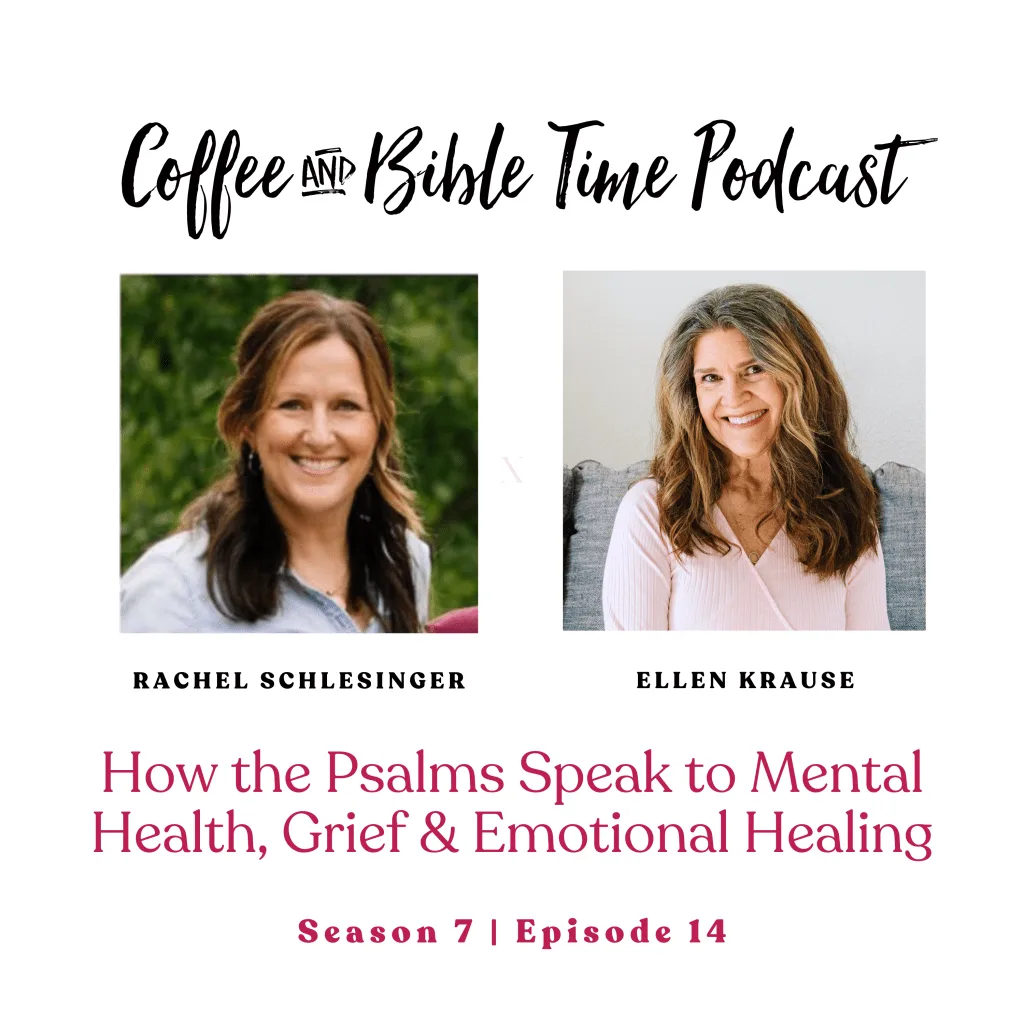Hosted by Ellen Krause
Using Psalms for Mental Health
Can the Psalms help with anxiety, grief, and emotional burnout? Rachel Schlesinger shares how reading the Psalms daily became a lifeline during motherhood and loss.
Discover how Using Psalms for Mental Health offers peace, healing, and spiritual grounding for modern mental health struggles. If you’re seeking comfort, stillness, or deeper connection with God, this episode will guide you in using the Psalms as a pathway to emotional and spiritual wellness.

This episode was first published on July 11th, 2024.
God made us with BIG feelings. But if you’re anything like me, some of those feelings—like grief, depression, or anxiety—can feel too big to process.
In situations like that, I am using Psalms for mental health.

Using Psalms for Mental Health isn’t a trendy wellness hack—it’s an ancient, God-given invitation to dwell with Him in every emotional season. Long before mental health was a modern phrase, God gave us the Psalms: honest prayers, raw emotions, and steady reminders of who He is when life feels overwhelming.
If you’re anxious, emotionally exhausted, grieving, or simply worn thin by the noise of life, the Psalms meet you right where you are—and gently lead you back to solid ground.
Transcript Using Psalms for Mental Health
Rachel:
Thank you, Ellen.
Ellen:
Great to have you here again! I’m so excited to have you back on.
Rachel, for this episode, let’s go back to the year we were in Bible study together. It was time for our summer break. Can you share with us how you came to spend your summer studying the Psalms and how you went about doing that?
Using Psalms for Mental Health by Writing Psalms
Rachel:
Yeah. I don’t know if your memory is any better than mine—I was trying to place the year, and I feel like it might have been around 2013. One of the reasons I think I even know that is because the little journal book you gave us that summer had a copyright date of 2013, so I’m guessing that’s about the time it was.
We had this challenge—to “glean” through the Psalms. That was the word: “glean.” I still have everything from that time, and it’s such a joy to look back. I have that little piece of paper that encouraged us to read one Psalm a day, in any order we wanted, and just write down what we learned about God’s character and His ways, or note a verse, or summarize part of the passage. That’s where it started.
When I looked back on this, Ellen, I thought—Psalms was my first love. You know what they say—you never forget your first love. That’s really where it all started for me.
I ended up writing everything down—because you could pick any order, I started losing track of which ones I’d already read. So I wrote down, on the back of my paper, every chapter and marked them off as I went. I’d also look at how much time I had that day—did I have enough time to read a longer one, or would I read a shorter one?
I can still picture that time in my life. I was living in my townhome, and I can picture the chair I sat in to read. My oldest was about two years old, so I had to wake up before him and try to time that right. But that was the start of it all.
We’ll get into more of it in this podcast, but anytime I’m in conversation—whether with friends or anyone—the Psalms always come back up. Like I said, you never forget your first love.
Using Psalms for Mental Health by seeing Themes in the Psalms for Mental Health
Ellen:
I’ll never forget the look on your face when we met again the next year. I remember you saying, “Oh Ellen, I’m so glad we had that summer challenge to read through Psalms.” I could tell just by the look on your face how much you had gleaned from it.
As you were going through them, what recurring themes related to emotional well-being did you notice throughout the Psalms? So many people right now are struggling with emotional well-being. What can we take from what you’ve learned that might help someone?
Rachel:
When I was thinking about the themes in the Psalms, I kind of put them into three basic categories:
- God is in control.
- He greatly loves us.
- There is a period of waiting.
God talks about being our dwelling place, about being near to us, encouraging us to seek Him when we’re troubled. He hears, He knows, He answers us. That’s prevalent throughout the Psalms.
Even when we feel forgotten—like, “Did God forget about me? Does He know what I’m going through?”—the Psalms remind us that He is still worthy of trust and praise. They encourage us to look back on how He’s been faithful, so we know He’ll be faithful again.
That’s the “God is in control” part. Thank goodness He holds us in His hand.
Then there’s the love—His love endures forever. There’s nothing we can do—right or wrong—to earn or lose that love. Psalm 84 talks about yearning to be with Him, to be home with Him. There’s this love that just isn’t complete without God. It speaks to that deep yearning in our lives.
The basic truth: I’m loved. I’m dearly loved. I’m wanted by Him.
Then the waiting. There are so many examples. Psalm 40:1 says, “I waited patiently for the Lord.” Which means—you had to wait, and we don’t like that! Psalm 27:14 says, “Wait for the Lord; be strong and take heart and wait for the Lord.”
When it comes to mental health or emotional well-being, we crave a sense of safety. That often means control—control over circumstances, outcomes, the future, the unknown. The Psalms bring these themes together: God is in control. He loves you. And there is waiting.
There’s more I want to say about that later, but I once summarized what I learned from all of it with this list:
- Do not fear.
- Concentrate on trusting God.
- Just do what needs to be done.
- Relax in His sovereignty.
- Remember that He goes before me and He will bring good.
Ellen:
Those are such powerful themes that all of us have experienced. We can latch onto that—God, His Word, His faithfulness.
But it’s so hard in the moment, isn’t it? When we’re in the depths of not knowing—feeling out of control, unsure about the future, or just overwhelmed in a specific situation. I love how the Psalms always draw us back, and like you said, looking back at God’s faithfulness helps us move forward. It really is our only hope. It’s what gets you from point A to point B when you’re in such a hard state, oftentimes.
Silencing Mental Noise by Using Psalms for Mental Health
Rachel:
Yeah, and if I can just expand on that—mental health, or mental well-being—what is it really? Our mental health is so closely tied to the themes we see throughout the Psalms. It’s connected to our sense of security, our sense of place and belonging, our confidence, our self-worth. That’s a big part of it. It’s also connected to our environment—our surroundings, whether our basic needs are met, how busy we are. When we’re in a noisy, chaotic season, our mental health can suffer.
You can’t hear God when there’s so much noise—voices, sounds, distractions. That’s why a verse like Psalm 46:10, “Be still and know that I am God,” is so powerful. That’s my anthem. Be still. God can speak loudly, but I believe He most often speaks in a still, soft voice.
As you know, I’m a health and PE teacher, and each year we have a lesson on hearing and decibels. We talk about how 80 decibels is where noise starts to become uncomfortable, and over time, prolonged exposure—even at just 80 decibels—can cause hearing damage. As the volume increases, we lose the ability to distinguish individual voices. It all blends into chaos, and that leads to stress and anxiety.
When you relate that to mental health, it becomes obvious: too much noise drowns out God’s voice. Noise is all the open mental tabs we’re juggling. My coworker and I say this all the time: “Too many tabs are open!” Whether it’s saying yes to too many things, social media, opinions from others, or just the pace of life—it all becomes noise.
And how do you recover from that? After a loud concert, what do you do? You rest your ears. You’re still. You’re quiet. The same goes for your spiritual ears. That’s where soaking in the Psalms comes in. For me, during a difficult time in my life, the Psalms reminded me that God is in control, He loves us, and we have to wait quietly for Him to speak.
Ellen:
That’s such an important reminder. I really needed that today. And I loved the analogy about all the open tabs—it really does feel overwhelming at times. We do have to be intentional about how busy and noisy our lives get. So, Rachel, how did your knowledge of God change and grow through reading the Psalms, particularly when it comes to finding comfort and hope?
Using Psalms for Mental Health:A Simple Way
Rachel:
I remember at the start of our Bible study, I thought, “People always say read your Bible—but how do you actually do that?” Do you just flip through and stop somewhere? Pick a random book? I was struggling with that. But what helped me was simply writing down what I was learning about God. That felt manageable—it was a baby step.
Looking back through my Psalms journal, it’s just passages and short summaries. I needed structure, so I limited myself to one page per Psalm. It’s nothing fancy, but it’s a record of who God is. When I moved on to Proverbs, I did the same thing, and then started writing short prayers at the bottom of the pages. Eventually, I began a separate journal just for prayers. So, with every book, every step, and every storm, my understanding grew.
What the Psalms really taught me was how to dwell with God. When I started this, I was a new mom—exhausted, overwhelmed, and emotionally drained. That transition from independent woman to selfless mother takes a toll on mental health. But during that time, God filled my bucket—more than I thought I needed—so I could keep giving even when I felt empty.
Also, when you go through storms, you’re building a foundation without even realizing it. Every missed day, every routine day, every “I did it right” day—it’s all part of building that rock to stand on. In one particular storm, I started going back through my notes and marking all the places God had shown up. Little things—like a perfectly timed phone call—became proof of His presence. That’s what the Psalms taught me: document, so you can go back and see His evidence and your growth.
Ellen:
That’s so good. I love that you pointed out how simple it can be. Everyone’s busy, but this is something small you can do. It even makes me think of my daughter Ashley—she just had a baby four weeks ago. During those early weeks, time is scarce, but even while nursing, she could pick a Psalm and reflect on who God is.
Rachel:
Exactly. And I’d add that “dwelling” looks different in every season. When you have a newborn, when your kids are older, when you’re single, when work is overwhelming—it all shifts. We have to give ourselves grace and not compare our walk with others’. You might plan to get up early and read your Bible, or read after the baby is asleep—but then life happens. It’s okay. Dwelling doesn’t have a checklist. You don’t have to complete something to a certain standard. Just dwell when and how you can.
Emotional Healing: David’s Example by Using Psalms for Mental Health
Ellen:
Yes, excellent reminder. Let’s talk a little bit about King David, who wrote many of the Psalms. What did you learn from how he reflected and meditated, and how has that helped your mental health?
Rachel:
David is such a rich example. He experienced every emotion and situation—joy, sorrow, betrayal, confidence, doubt. Wherever you’re at—feeling great, lost, hurt, or victorious—David’s been there. And what he teaches us is that anyone can be used and loved by God. David sinned, feared, doubted—and yet he was called a man after God’s own heart.
His story reminds us that perfection isn’t the goal. It’s about having a heart for God. David was a son, brother, best friend, fugitive, king, adulterer, father—he lived the full spectrum. Through all of it, he loved God. His identity wasn’t in what he did or didn’t do—it was in his humility and vulnerability.
And when I think of “dwell,” I’m reminded that it’s a gift. We get to dwell with God now, and one day we’ll dwell with Him forever in heaven. That long-term view can help us carry the weight of today more lightly. God’s purpose will prevail, no matter what we’ve done. David’s pedestal wasn’t his success—it was his heart.
Ellen:
That’s so true. And something you said really struck me—how one of the biggest weights on our mental health is the inability to forgive ourselves. David committed serious sins, yet he repented and moved forward. There were consequences, but he accepted God’s forgiveness and didn’t stay stuck.
In our home, we have a chalkboard by the garage door that says, “God can use me in spite of my flaws.” I thought I’d change it eventually, but it’s stayed because it’s such a powerful reminder of grace.
Rachel:
Yes! And it’s such a great lesson for our kids too. When they mess up, they’re tempted to internalize it as identity. That’s what the Psalms help combat. They anchor us in who we are in God—not in our mistakes. When your identity is in Him, you don’t get stuck in lies like “I’m not good at this,” or “I’m a troublemaker.”
Using Psalms for Mental Health to Deal with Grief
Ellen:
Absolutely. And for those who don’t know—Rachel, you’re also a wife, mom, friend, and teacher. How have you relied on the Psalms in all these different roles?
Rachel:
Psalms really laid the foundation for me. It’s where my deep relationship with God began. It became part of who I am. I struggled with praying out loud at first—I’d lose my train of thought. Writing my prayers helped me slow down and stay focused, and that habit started with the Psalms.
Over the years, I’ve returned to my little Psalms journal so many times—during hard seasons, or just because I heard a sermon and wanted to revisit a passage. The Psalms have been my anchor through some of the hardest things—grief, crisis, fear.
The most recent example was losing my grandfather. From diagnosis to death, it was only 30 days. But God gave us the gift of time. We had a “goodbye weekend” as a family—telling stories, singing, praying. During that time, I felt led to Psalm 84. I read it aloud as a prayer for my grandfather and our family. It was such a comfort:
“How lovely is your dwelling place, O Lord Almighty… Blessed are those who dwell in your house; they are ever praising you.”
When we face death, we confront the biggest question: Is all of this really true? The Psalms give us that assurance and hope. They remind us that God sees us, knows us, and can be trusted—even with the unknown.
Ellen:
That’s so beautiful, Rachel. Thank you for sharing. It really shows how God’s Word is alive and active, how it sustains us in every season. I encourage everyone listening—pick one Psalm to memorize. For me, it’s Psalm 23. It comes to mind in so many situations. Just having it tucked in your heart is a gift.
And I want to thank you, Rachel. Your experience with the Psalms inspired us at Coffee and Bible Time to create our Psalms devotional—a 30-week guide through all 150 Psalms with both prompts and self-study. Your feedback was a huge part of that. Thank you!
Rachel:
Thank you, Ellen. The Psalms have been my greatest teacher. My deep relationship with the Lord began there. It started small—just one step at a time. But if you show up, He’ll do more than you can ask or imagine.
This week on the Coffee and Bible Time podcast, we revisited a conversation with my dear friend Rachel Schlesinger about how reading the Psalms daily became a lifeline when she was experiencing mental health issues, motherhood, trauma, and loss.
A Daily Psalm Practice That Transformed a Life
Rachel’s journey through the Psalms began with a simple challenge, shared in our women’s Bible study group: reading one Psalm a day for a whole summer. This simple habit—paired with journaling about God’s character—became a powerful spiritual anchor. As a new mother facing emotional exhaustion and grief, Rachel discovered how dwelling in the Psalms helped her process stress and experience lasting peace.
Three Core Biblical Truths
As we unpacked her journey, three key truths emerged from the Using Psalms for Mental Health that directly address emotional and mental health struggles:
- God is in control
- God deeply loves us
- Waiting serves a purpose
These themes speak to our human need for security, belonging, identity, and purpose—all of which are essential for maintaining emotional resilience.
Using Psalms for Mental Health to Address Anxiety, Depression, and Emotional Overwhelm
Rachel shared how the Psalms for anxiety and emotional pain became a lifeline when she was struggling with fear, grief, and burnout. Unlike self-help advice that avoids negative emotions, the Psalms embrace the full range of human experience—from joy and celebration to grief, lament, and despair. They teach us how to bring every emotion before God and find healing in His presence.
Silencing the Noise: Finding Stillness in the Psalms
One of the most powerful parts of our discussion centered on mental “noise”—the nonstop distractions, information overload, and internal chaos we all experience. This “noise” makes it nearly impossible to hear from God.
But Psalm 46:10, which says “Be still and know that I am God,” offers a healing invitation: to step away from the noise and find rest in God. Practicing stillness through the Psalms helps restore mental clarity, emotional peace, and spiritual focus.
King David’s Mental Health Journey Through the Psalms
King David, the primary author of the book of Psalms, struggled with fear, anger, depression, and guilt—yet he remained “a man after God’s own heart.” His life models how emotional authenticity and faith can coexist. The Psalms David wrote in times of sorrow, fear, or failure show us that God welcomes our raw honesty, even in our weakest emotional states.
Psalms for Mental Health: Verses that Bring Comfort in Grief and Loss
Rachel also shared how certain Psalms, like Psalm 84, became deeply meaningful following the deaths of her grandparents. In her grief, the words about longing for God’s presence brought hope and eternal perspective. For anyone navigating loss, heartache, or uncertainty, the Psalms for grief offer powerful, Spirit-led comfort.
How to Use the Psalms for Mental Health and Emotional Wellness
If you’re wondering where to start, Rachel’s approach is simple yet effective:
- Read one Psalm a day
- Reflect on what it reveals about God’s character
- Write down your thoughts.
- Be consistent—but don’t aim for perfection
This habit builds a spiritual reservoir that you’ll draw from in seasons of hardship and healing.
Final Encouragement: Let the Psalms Speak to Your Struggles
Whether you’re facing anxiety, depression, burnout, or just longing for spiritual rest, Using Psalms for Mental Health offers a clear path to emotional healing through Scripture. Their honesty, depth, and divine comfort meet us right where we are—and lead us gently into the presence of a loving, steady God.



 Apple Podcasts
Apple Podcasts Spotify
Spotify
Leave a Reply